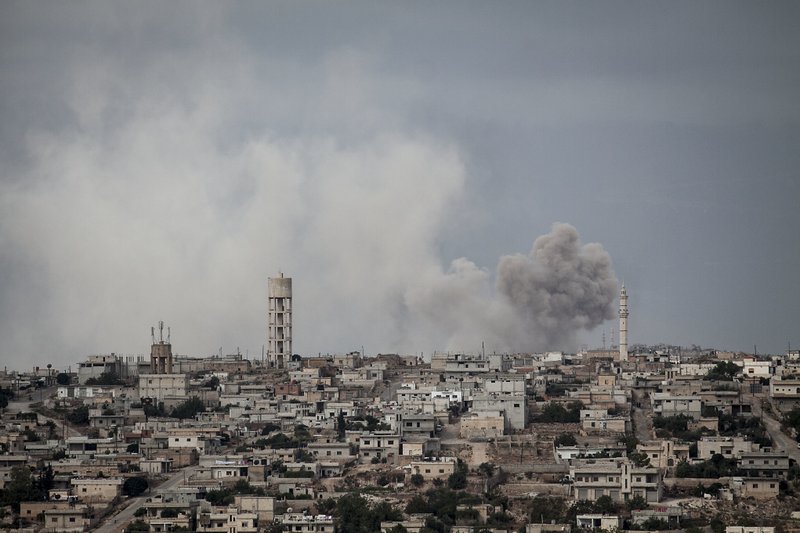BEIRUT -- Syrian opposition fighters blew up bridges Friday and dug trenches around their bases to impede an anticipated ground offensive on their last major stronghold in the country. They also called on residents to take up arms and support front-line fighters.
The looming battle for Idlib in northwestern Syria may be the last in the bloody seven years of conflict, which have backed hundreds of thousands of civilians into this deadly corner of the country with nowhere to run.
"This is our last chance to be free. The uprising is about to end," said Abdulkafi Alhamdo, a 33-year-old English teacher, who is awaiting the imminent birth of his second child.
Idlib and the surrounding area is home to some 3 million people -- nearly half of them, including Alhamdo, already displaced more than once by the civil war -- choosing to live in opposition areas.
On Friday, U.S. Secretary of State Mike Pompeo said 3 million Syrians "will suffer" from this aggression.
"The U.S. sees this [looming Russian-backed Syrian assault] as an escalation of an already dangerous conflict," Pompeo tweeted.
U.N. officials believe an offensive on Idlib would trigger a wave of displacement that could uproot up an estimated 800,000 people and discourage refugees from returning home as they see a new wave of violence unfold.
U.N. High Commissioner for Refugees Filippo Grandi, speaking in Lebanon after a visit to Damascus, said he had appealed to both sides in the conflict "to try to find a solution, a way forward" that spares civilians.
"If you have violent military action and loss of lives, you risk of course many deaths ... a human catastrophe," he told reporters. "But you risk also sending a message to refugees that the situation is not secured. [They] will be watching very carefully what is happening in Idlib in the next few months."
Thousands of government troops and allied fighters have been amassing in areas surrounding Idlib. Russia has said a military operation there is necessary to weed out "terrorists" it blames for attacking its bases on the coast.
The Britain-based Syrian Observatory for Human Rights said Syrian forces have deployed at least 2,000 armored vehicles along the front lines surrounding Idlib and Hama.
An offensive is likely to first strike southwest Idlib and the al-Ghab plains, which overlook the coastal area where Russia has its military and naval bases. Another front for the offensive is from the south and southeast, which would restore government control over an essential highway that runs between Syria's major cities.
The area, controlled by rebels since 2015, has been targeted by government and Russia strikes for months, leaving its infrastructure, schools and hospitals in desperate conditions. Now a wide-scale offensive is in the offing, with Damascus and its allies intent on making it a defining moment in the seven-year conflict.
Cornered between government areas and a tightly sealed border with Turkey, residents of the rebels' last bastion also live among the most battle-hardened fighters from all over Syria and thousands of foreign fighters who make up a significant part of the Levant Liberation Committee, an al-Qaida-linked group that controls most of the territory. For those fighters, the battle for Idlib will likely be the last showdown with the government, and they are expected to put up a hard fight.
The rebels' controlled demolitions of the bridges came after they detected movement of government troops in the area, according to Rami Abdurrahman, head of the Observatory.
Most of Idlib province and adjacent strips of Hama province remain in the hands of an assortment of armed groups, some Turkey-backed and others independent Islamist groups. But the strongest alliance of fighters is led by the Levant Liberation Committee.
The group has called for residents' support by way of fortifying the province's perimeter, taking up arms alongside their fighters or volunteering at front-line hospitals and kitchens.
On Friday, thousands protested in various Idlib and Hama towns, denouncing threats of an attack and trumpeting the area's readiness to fight. The Levant Liberation Committee's administrators had called for the protests.
Turkey said it is seeking to ward off a full-scale offensive, urging Russia and Iran to allow more time to separate "radical militants" from the armed groups it has backed.
"We are working toward stopping this attack," Turkish Foreign Minister Mevlut Cavusoglu said in Vienna on Friday.
Turkey fears a humanitarian crisis on its borders. The country's defense minister and intelligence chief have visited Moscow while Iran's foreign minister has held meetings in Ankara over the past few days. A summit is expected in Iran between Iranian, Turkish and Russian leaders next week
Information for this article was contributed by Suzan Fraser of The Associated Press.
A Section on 09/01/2018
